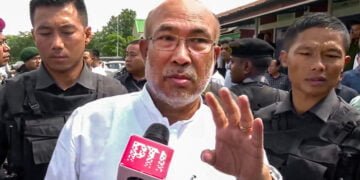The month-long turmoil in Bangladesh reached a crescendo this weekend as the students’ stir not only resulted in overthrowing the Sheikh Hasina-led government but also forced the Prime Minister to flee her own country to seek a safe refuge elsewhere. On August 5, Hasina arrived in India in a military transport plane of Bangladesh Air Force which landed at the Hindon Air Base in Ghaziabad hours after resigning as the country’s Prime Minister and leaving Dhaka en route to Delhi. India has not decided on Hasina’s future plans, and it was suggested that she should be given some time to decide where she wants to go.
It all started with a protest against reservation that used to give 30 per cent of government jobs to the families of people who fought in the 1971 war of independence from Pakistan. However, the Supreme Court of Bangladesh ordered that the veterans’ quota be cut to 5 per cent. The SC order did not help to bring calm as protesters demanded Hasina’s resignation. The nationwide anarchy and mayhem, following Hasina’s ouster is set to have far-reaching implications, transcending Bangladesh’s borders amid efforts to convince Nobel laureate Muhammad Yunus to take over as head of the interim government in the country.
The Awami League government-led by Hasina which won the recent elections by a landslide margin of 224 out of 300 seats is accused of suppressing the Opposition’s voice by using ruthless force which resulted in unprecedented anti-government violence which claimed over 300 lives. Never did Hasina, who is also known as an ‘iron lady’ for remaining affirmed on her decisions, had thought that students’ protest would snowball to the extent that it would end her fourth term political career and throw the country in the grip of unprecedented violence.
Hasina’s departure marks the end of an era in Bangladeshi politics, leaving the future political landscape uncertain. As the country reflects on her legacy, the debate over her leadership style and the balance between stability and democracy will undoubtedly continue. Hasina’s ouster comes as a setback for India too as the two nations shared good ties and relationship during her tenure while it was not so when Khaleda Zia-led Bangladesh Nationalist Party (BNP) held the reins of the country, along with radical outfit Jamaat-e-Islami.
India, being Bangladesh’s immediate neighbour, has reasons to be concerned. Policy makers in Delhi are keeping a close watch on the fluid situation in Bangladesh. India will also have to readjust its relationship with the interim dispensation in Dhaka. Around 20,000 Indians are in Bangladesh and most of them were students, of which around 8,000 have returned to their homeland. As the Bangladesh situation unfolds, it is imperative for the government of India to ensure the safety of Indian nationals residing there.

























